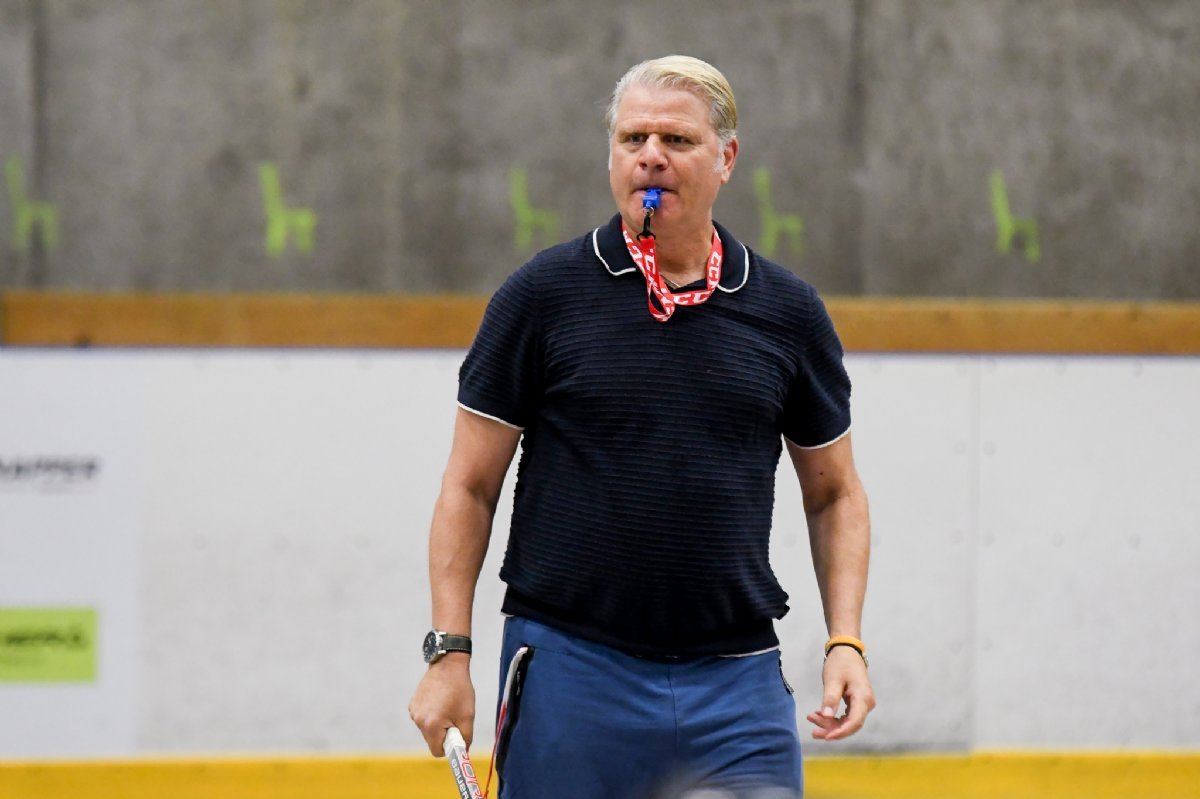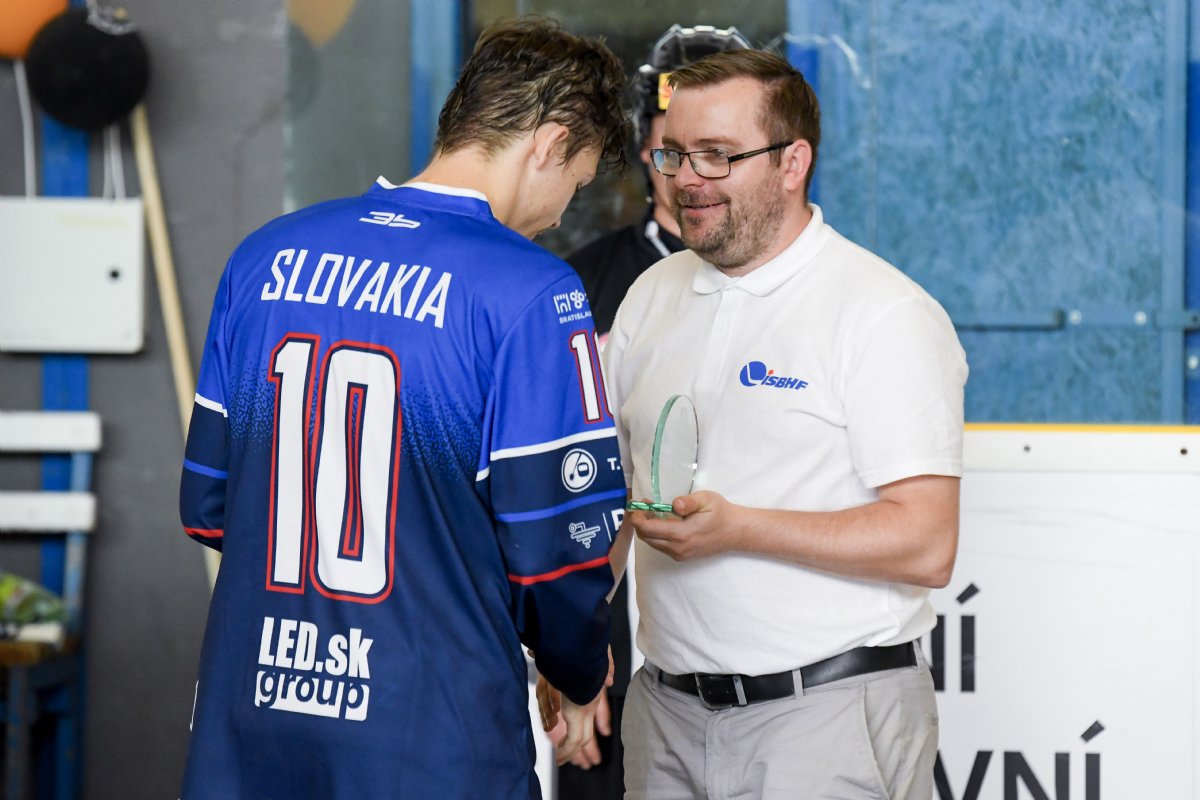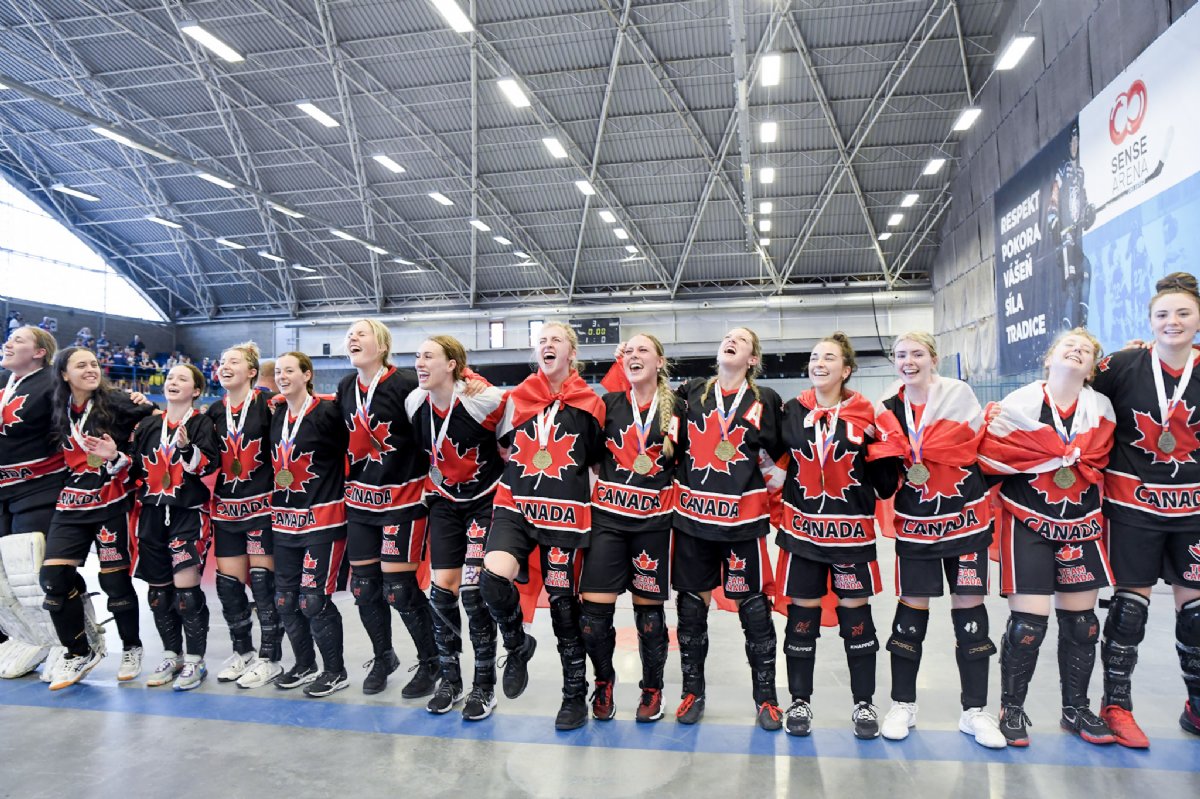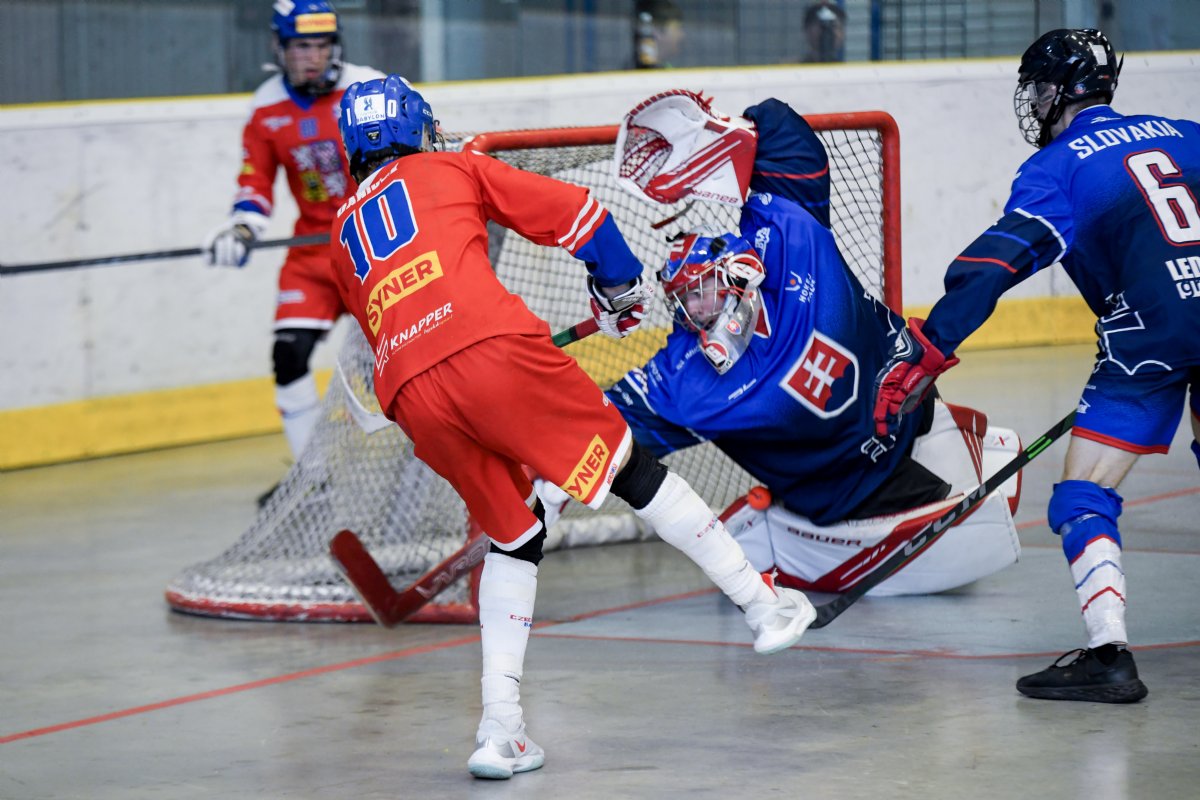
6. 7. 2023 - David Schlegel
Former ISBHF President George Gortsos: Czechia is a ball hockey Lamborghini
How did you start to play and love ball hockey?
That started in Toronto. My parents are Greek and we moved into an English area of Toronto, I was born in Toronto. My parents wanted me to play soccer but the kids in the neighborhood were hockey players and from there, I learned the love of hockey and ball hockey. We just started playing in the neighborhood, competing. I was a good soccer player, and I became a good ice hockey player and a very good ball hockey player, mainly because I was a very good runner. That was a gift I got. I started loving the game, I was playing it in high school. I was on the best team in high school, then I was on the best team in Toronto, then I was on the best team in Ontario. Then we won the Canadian championship, then I was the captain of the Canadian team that won in Bratislava, the first one. And then they asked me to coach Canada for 10 years, we won four World Championships.
You chose to be a defenseman. Why?
Because I think defense is a special challenge. You have to adjust to the talent of the offensive players. From a young kid, I had the energy to defend. Maybe that's my personality. I was a fullback in soccer, I was a defender in ball hockey, this is in my blood. To be a good defender, you have to want to be able to meet the challenge of the offensive talent. I also was a very good athlete who was in very good shape, and I learned that if I'm in better shape than the offensive player, I can dominate them. But I also studied them, and I think this is what made me a good coach.
In 1996, you came to Bratislava and picked up a lot of points - one goal and twelve assists. You also became the leader of the team that won the gold medals. Was it special for you and how was the first World Championship team put together?
At that time, it wasn’t as structured as it is now. My team, the Fernview Rangers, was from Toronto, and they won three Canadian championships in a row. And the other team, that was very good, was the Montreal Storm. So what the CBHA did is they put 10 of the best from Fernview and 10 of the best from Montreal, and we became the national team, not like we do it now. The 1996 World Championship was a special one. Slovakia had Pavol Demitra, Germany was there and Marco Sturm was playing on that team, the Czech captain was Vladimír Kameš… There were some very good players. The Czech team had a very good goalie who ended up being the General Manager of Pardubice, Dušan Salfický. In the end, we ended up playing the Czech Republic in the final, we won 5-2, and we beat Slovakia in the semifinals in front of a big crowd. It really made me appreciate the love that especially the countries of Slovakia and the Czech Republic have for ball hockey.
How did the switch from a player to a coach happen?
I thought I was going to retire, but the Canadian team was going to the 1999 World Championships in Zvolen, and two weeks before, they fired their coach. So they called me up and said: “George, we need you to come to coach the team.” I didn't select the players so I had to get to know them. Essentially, I said: “Okay, I'll do it.” And we ended up losing in the final in the shootout to Slovakia. Peter Babák of Slovakia scored the winning goal, it was the first championship that Slovakia ever won. What I said to myself was: “Okay if I'm going to do this now, I have to go build a program.” So I said to the executive: “You’re going to have to allow me to have camps, you’re going to have to go across Canada, you’re going to have to find who the best players are and then bring them together to see who's going to be on Team Canada.” In Canada, we don't have funding like the Czech Republic and Slovakia, so when I went across Canada we would charge the players a nominal fee. But those fees helped the players when we went across the way. And a lot of the coaches that are here now coaching Canada, I mentored them, I'd say 90% of them. They would come to my camps, and they would learn.
In 2001 in Toronto, we beat the Czech Republic in overtime, then in 2003 in Sierre, I think that was my best team, we beat the Czech Republic 6-1 in the final. In 2005, we played Slovakia, we won 5-2 in the final. In 2007, we played the Czech Republic, and we won 5-0 in the final. And finally, my career ended in 2009 when we lost to the USA in Plzeň. A lot of people wanted me to stay but I felt like I had to give somebody else a chance. I guess that fate had it that they wanted me to become the president, so somehow I got there right after.
Would you stay if you would have won in 2009 or not?
If we would have won, probably I would have stayed. We lost a lot of players because of funding, a lot of our stars couldn’t come, but I thought that team had a chance. It would have been a great game to play the Czech Republic in the final, I think that would’ve been the right result. But the USA beat us fair and square, and I think ball hockey is always giving me a fate of where I'm going to go next to help the sport. All of a sudden, people were saying: “George, you should become the president.” And I said “okay”. When I was to become the president, my goal was to make all the federations a family. And when I see the Czechs, the Slovaks, the Swiss, the Americans, the Canadians, the Brits, how all of us get along now for the good of ball hockey, I think this is the road that I paved and I'm very happy about that.
You became the president in 2012, three years after the Plzeň World Championship…
In between, I was running camps in Canada, teaching young coaches how to do things. I was kind of a high-performance coordinator. Like I said, a lot of the coaches here, I was giving them my knowledge. Actually, it was the CBHA that said: “George, would like you to go run for presidency?” So I ran. In 2012, I was elected in the Czech Embassy in Paris, right beside the Eiffel Tower, one of the most beautiful places I've ever been, and I can remember going: “Wow, this is something!” That’s why the connection to the Czechs has always been there. So in the Czech Embassy in Paris, I was elected for the first time as the ISBHF President.
I heard that there were some troubles in Canadian ball hockey those days, that it was not very united. How did you see that, where was the problem?
There were forces in North America that were leading the sport towards making money. My goal was to lead the sport towards growth without the only thing being considered is making money. So that's where the split occurred. And at the end of the day, what happened was more of a democratic and unified thought process where it wasn't one or two people making a decision, it was a group. And this is what I believe in, I believe in people working together. I was part of the push to take Canada out of being run by one or two people into being run by a consortium of like-minded people. And I think the CBHA is in a better place now. These fights are always going to occur, just look at life. There's always money and there's always equality and fairness, and it's always a battle. Within that, if money is the goal, then you start having sneaky things happen when there's no oversight. You have to have oversight, and you have to have openness because, in the end, it's about the players.
You were the President for 10 years which is a very long period of time. In many sports when this happens, the President often starts to feel like a king, like in soccer. How did you fight this feeling?
It was never a fight for me because I'm a pretty honest person. I was fighting for what I was fighting for in the CBHA, and when my time came in the ISBHF, if I would have said that I have to stay because of that feeling, then I would have been doing what I was against. The way ball hockey works for me is that it always leads me somewhere, to do something for the sport. In Pardubice, I saw a couple of young boys working hard, one of them was your media guy Jakub Borovsky, and another was David Tor. And I said to myself: “There is a very good young man who is very honest and does things in a structural way.” I was very lucky to get David and bring him in. When you see a good player, you bring them into the team. And I saw a very good player, David was very important to me.
Then the board became a family, Elio got elected… I used to play against Elio. He hated me, I hated him, but Elio runs of the biggest youth leagues in the world, the guy loves ball hockey. So my thought process when I left was I'm leaving the team in a good way, just like I thought when I was leaving Canada. I think the ISBHF is heading in a very good direction and I feel that way because there are good people that I worked with there. So to answer your question, I never felt like a king. I felt like just somebody who was there to represent the sport. I don't think I'm bigger than the sport, I don't brag about what I've done. I did it, it’s done, the people who know me know I was a great player, I was a good coach, I did my job as the President… That is behind me now, let's see what I can do now, I’m heading towards being 70 years old.
Are you proud of something you achieved while being the President? And is there something you feel you should have done differently?
I'm proud of the fact that we worked very well as an executive group, it was very collegial, very family-like. When we disagreed, it didn't spill over into personal, and that was very good. As you said, there was turmoil in the CBHA, and when I was elected in 2012, there was turmoil in the ISBHF, and my goal was to smooth it out. When I was elected, I said I wanted to do three things. Make the ISBHF board a family, working in a very professional way; secondly, I wanted us to investigate what it took for us to be recognized by the Olympic Association; and thirdly, I wanted to make sure that the USA became a unified organization under the ISBHF. I can tell you that I worked very hard to bring the USA together. I think there was some tension by the nations to understand totally, but you can see the results today, the USA is growing. I think that was the thing I protected the most as the President, I actually was very aggressive. And I'm not aggressive unless I'm coaching or playing. I was aggressive because I knew what was right, and I knew that the family of nations would gain from it. The proof can be seen now, and I think it's the best thing I did for the ISBHF.
I also did go very many times to Lausanne to talk to people in the Olympics, they thought our sport was fantastic. But we have to build the structures, have democratic organization, finances audited, elections… A sport like floorball had a lot of money to be able to build those organizations because from their headquarters in Sweden, they can pull down money so that national federations could be built quickly. They were recognized because of that, because they had over 40 nations. In ball hockey, for the most part, besides the Czech Republic, Slovakia, and Switzerland, there is no national organization that has any funding. The sport is self-funded and it's done as an act of love. But to get to where we need to go, we still need to have the structures, and I think that knowledge was given to the new board. I think the challenge is how do we present the international name of our sport to be unique in the diaspora of the Olympic family. I don't know, but it's certainly something that we have to think about because if our goal is to get recognized by the Olympic Federation, we must have a name, and we must have all those infrastructures to be able to gain acceptance. If we were able to get recognized, the funding would come to all our national organizations. I feel this is important for the future of the sport because then national organizations could build coaching programs.
When I look at the Czech Republic, they are the Lamborghini with their structure. But they have funding, they can do it because there have people who are there. The other organizations are doing it through people that love doing it, they just don't have the money. And if we can get there, then I think the sport can go to the next phase. So when I look at the three things – the USA was completed; making the ISBHF a family was completed; the knowledge I gained going to the Olympic Association has been passed along. We know what we need to do, now it's up to the new board and the leaders of the federations to see if we can get there. Those are my presidential things.
After 2022, you left ball hockey for a while. Why?
I wanted to take a step back for a while. And then in March of this year, I was talking to Great Britain and they said: “George, should come down to the Fantastic Fours tournament.” So I went down there, and I was watching and I go geez, these kids here, they love the game. I spoke to their executive and I said: “You know, why don't I come and coach?” And they said that’d be a great idea. Here it is again with this sport, I leave a job and I find somewhere else I can help the sport. I always believed if you're in a sport, you got to leave it in a better place.
A lot of people may not understand why a five-time world champion would want to go coach the GB, but if you see how much those kids, those girls and guys love it… My goal is to build a foundation for the future for Great Britain. I think it's important for the ISBHF that the GB get strong. I think this will be my final job, I’m 62 now. It’s my gift to the GB that I'm going. And we're going to do our best, we’re going to have camps, I'm going to teach them, I'm going to mentor them, we're going to teach the players… I think if you talked to one of my players, they would say that I’m a very simple guy. Not very many systems but I'm what's called an inside-out coach – I don't expect the players to play well for me, I want them to play well for themselves so I get to know them. I get to know what makes them happy, I push them of course, and they know they're part of the team. And then they give it back to the team through me. It’s going to be a very challenging job but I think it's going to be a fun job. And I think it comes at the exact right time for me with all the knowledge I have. I've seen more games and played more games than anybody in the world, I know the sport, it’s in my DNA. Now I give it and I don't expect anything back because I love the sport, it's a beautiful sport.
I’ve talked to a lot of ice hockey people and sometimes I get frustrated that they don't see how much this sport can help. I coached Alex Burrows. If Alex Burrows didn’t play ball hockey, he wouldn't have his NHL career. Andrew Shaw, won the Stanley Cup, played ball hockey. The athleticism, the running… If you take a wrong step in ball hockey, you're out of position. So if you’re an ice hockey player, you’re going to get in shape and you're going to learn what I call “immaculate hockey positioning”, you're going to know exactly where to go on the ice. I coach AAA ice hockey, Mike Cammalleri was one of my players, I see a correlation. But a lot of the intelligentsia of hockey don't get it. Me myself, when I used to go to the Hockey Canada meetings or I talked to the IIHF, I said: “Ball hockey, for you guys, is the vitamin of health.” Most kids today can't afford ice hockey. In ball hockey, all you need is a stick and a ball. Floorball is great, I don't have a problem with floorball, but it's a different sport. If you’re six feet tall, you can only use a four-foot stick. In ball hockey, you can use a hockey stick. There’s a hard ball, you shoot on a real goalie, you have to run the floor… For me, it's the closest thing. Roller hockey, you're doing circles. Ball hockey, you have to be precise, and then you can take that into ice hockey. But we're not there yet, ice hockey doesn't want to get there.
And to their detriment because in Canada, the number of hockey players is going down. Why? Because the families cannot afford the cost to play. I think people got to get their heads around that and get kids just playing ball hockey. Look at me, I was born in Toronto, a Greek boy. My parents didn't know hockey but because I got a stick, look at where I ended up with my life. And we need to do that with kids around the world. We have Hungary coming today, Zoltan Kovacs is a big man in the IIHF, and they've asked me to run the practice. These are very important partnerships that we have to build. I go back to it, I think ball hockey is the vitamin of health for the sport of hockey. I hope people get around it.
What would you like to achieve with the team of Great Britain?
I don't need the win but I need to build a foundation for the future. What I need to do is build simple platforms of success so that the program, through the coaches I'm going to mentor, will find their victories. For me, my victory will be when I see 20 GB players that are in shape and ready to play to the best of their abilities. If they play to their best abilities, that's a victory for me. I had won so much in ball hockey, I don't need it. All I need to do is something good for the sport and that's my goal.
I'm lucky that my job allows me to do it, they support me. I have a very serious job, I work in enforcement at the Ontario Securities Commission, we monitor the stock markets. I'm on a special fraud team, I'm an investigator there, it's a very demanding job. This is my message to the kids out there that look at ball hockey – all the things I learned playing the sport brought me on a team of 25 highly talented people, lawyers, forensic accountants, ex-police officers, law clerks, support staff… All of us are a team, and I think I brought that mantra to that group and we've been very successful. I think I'm going to be there as long as this unit stays together, I'd like to be there another 3 or 4 years, another 3 or 4 with the GB team, and then I'll kind of go off into the sunset.
Next articles
Article archive
ISBHF Technical Director Nemček: We actively discuss video referees and rule innovations

Canada U21 celebrate gold!

 Menu
Menu
